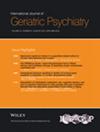Determining the Psychometric Properties of the Turkish Version of the Positive Caregiving Experience Scale in Dementia
Abstract
Background
Caring for individuals with dementia presents significant challenges for caregivers. However, positive experiences such as personal growth and emotional satisfaction play a vital role in fostering resilience and improving caregiving outcomes. This study highlights the need for a culturally relevant tool to assess these positive feelings, focusing on the adaptation and validation of the Dementia Caregiver Positive Feeling Scale for Turkish caregivers.
Objectives
This study aimed to carry out the Turkish validity and reliability study of the 21-item Dementia Caregiver Positive Feeling Scale.
Methods
This methodological study was conducted between February and December 2023 with 200 caregivers of dementia patients receiving treatment at the education and research hospital in Samsun, Türkiye. Data were collected using an individual information form and the 21-item Dementia Caregiver Positive Feeling Scale. Data analysis was performed using SPSS 22.0 and Amos 22.0 software. Cronbach's alpha reliability coefficient was calculated, and exploratory factor analysis and confirmatory factor analysis were conducted to test the construct validity of the scale.
Results
The average age of caregivers was 45.18 ± 12.02 (min = 18, max = 78), and 78.0% were female. The average caregiving duration was 4.07 ± 3.00 (1–18) years. The total Cronbach's alpha value of the scale is 0.80. Exploratory factor analysis revealed a KMO coefficient of 0.756 and a Bartlett's test result of χ2 = 960.382, p < 0.001. Factor loadings ranged from 0.32 to 0.61 and the total variance explained was 47.232. Confirmatory factor analysis supported the scale's 20-item, four-factor structure, with fit indices indicating an acceptable model fit: RMSEA 0.07, GFI 0.85, AGFI 0.80, CFI 0.77 and χ2/sd 2.15 (p < 0.001).
Conclusions
The Dementia Caregiver Positive Feeling Scale has been determined to be a valid and reliable instrument for the Turkish community. It serves as a valuable tool that can be used in research evaluating the positive experiences of caregivers of dementia patients.


 求助内容:
求助内容: 应助结果提醒方式:
应助结果提醒方式:


